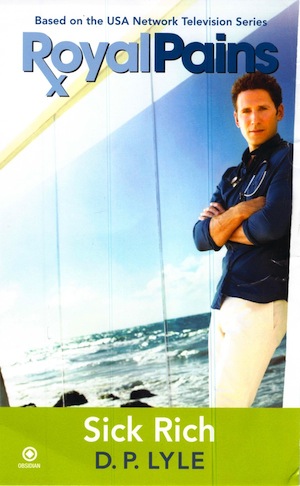Here is another great guest blog from Dr. Frederick Strobl. This time he discusses the very odd syndrome known as Locked-in Syndrome.
Imagine the unimaginable. You awaken to find that you can think normally, but not speak. You try to move your arms and legs, but you are totally paralyzed. You can’t even lift your head off the pillow.
You can see and hear normally except if you look to the side, you have double vision. While completely functional, mentally, you are overcome with dread . . . you are a prisoner trapped inside your own body, locked-in from the rest of the world.
A nurse comes in to check your blood pressure. You can feel the pressure cuff inflate. Suddenly seeing your eyes open, she drops her stethoscope on your legs. You feel that too! She quickly returns with the neurologist. After examining you, he says the fateful words: “She is locked-in, I’m afraid.”
Locked-in syndrome is a rare neurological condition characterized by complete paralysis of the voluntary muscles in all parts of the body except those that control eye movement or blinking. It may result from a massive stroke, traumatic head injury, diseases that destroy the myelin insulating sheath surrounding nerves, and in rare cases, a toxic medication overdose. Individuals with locked-in syndrome are conscious and aware, able to think and reason normally, but are unable to speak or move. In a few cases, patients may regain certain body functions, but the chances for recovery are limited. The damage is located in the brainstem which connects the brain with the spinal cord.
Until the 1960s, people with this condition were considered brain damaged even when their higher brain functions were normal. While locked-in syndrome is better diagnosed today, it imposes a frightening and frustrating experience for the sufferer who can feel sensations of pain, hunger, itching, and the scope of human emotion, but cannot react or readily communicate such needs or desires.
Jean-Dominique Bauby, a French journalist, suffered a massive stroke at age 43. He was diagnosed with locked-in syndrome and learned to communicate by blinking his left eye. Through this method, and with the help of a dedicated assistant who repeated letters of the alphabet to him, Bauby ultimately wrote The Diving Bell and the Butterfly, which was later adapted into a film.
In the last decade, some advances have been made in assistive technologies. These include the implantation of sensors in the brain that allow the patient to move a computer cursor using thoughts or even convert thoughts into speech also through the use of a computer creating the sounds.
Similar to locked-in syndrome is a harmless but frightening condition called sleep paralysis. Essentially, in a healthy patient, the brain awakens from sleep before the rest of the body. Usually lasting for seconds, patients who have experienced this condition have expressed that it would be a fate worse than death.
Frederick (Fritz) Strobl, MD is a neurologist and a Director of the Minneapolis Clinic of Neurology, one of the largest private clinics in the world devoted entirely to neurology. His Dr. Jack Stevens series of medical thrillers includes Presidential Migraines and Greek Flu. His next book, Cyber Death, is due to be released in April 2012. Contact Fritz at Fritz@FritzStrobl.net or visit www.fritzstrobl.net.
Here is an interesting article Fritz submitted on reading brain activity and its possible use in Locked-in Syndrome.



























Sam
September 8, 2011 at 3:21 pm
I started experiencing sleep paralysis in my teens. It occurred every few months or so for many years. It was terrifying until a psychology professor mentioned the phenomenon as an aside in a lecture. Once I knew what it was, it stopped being quite as frightening and I learned to wait for it to pass. It hasn’t happened in about a decade, and I don’t miss it a bit.
LikeLike
Fritz Strobl MD
September 9, 2011 at 5:05 pm
Imagine it not going away and you have an idea of Locked-In…
LikeLike
Craig Faustus Buck
September 8, 2011 at 3:24 pm
Is there any way to induce and/or prolong sleep paralysis?
LikeLike
D.P. Lyle, MD
September 8, 2011 at 3:35 pm
Not that I’m aware of but some people will react to certain sleep meds with similar symptoms–confusion, disorientation, terrors, paralysis, sleep walking, etc. This can be particularly true if mixed with other sedatives or psychotropic drugs and is not all that uncommon in the elderly, especially those with dementia.
LikeLike
Clare K. R. Miller
September 8, 2011 at 8:55 pm
Wow, that is terrifying and fascinating.
LikeLike
christinehusom
September 9, 2011 at 11:26 am
It must be terrifying for those suffering with locked-in syndrome. I imagine it is also life-shortening, since the victim can’t exercise or eat normlly.
LikeLike
Fritz Strobl MD
September 9, 2011 at 5:06 pm
Yes, usually they die of pneumonia.
LikeLike
Kate B.
September 9, 2011 at 1:51 pm
I have experienced sleep paralysis and it wasscary enough. The idea of beign permanently trapped in this state is terrifying.
LikeLike
Fritz Strobl MD
September 9, 2011 at 5:07 pm
A horrible fate. Do you have narcolepsy?
LikeLike
Bridget Cagan Herron
September 9, 2011 at 1:51 pm
Can a person get Locked In Syndrome caused by having a brain biopsy?
LikeLike
D.P. Lyle, MD
September 9, 2011 at 2:57 pm
That would be a very odd occurrence and if the syndrome occurred it would more likely come from whatever problem lead to the need for the biopsy in the first place.
LikeLike
Rin
September 12, 2011 at 3:47 am
Wow, what a horrible thought! I’ve only ever experienced this kind of thing once, on coming round from a general anaesthetic, where my brain woke up before my body – I was really cold but I couldn’t move, speak or open my eyes to get someone’s attention! Thank goodness it wore off and I’ve not experienced anything like it since.
LikeLike
Fritz Strobl MD
September 12, 2011 at 9:40 am
So you can identify! Spooky stuff!
LikeLike
hil
September 16, 2011 at 7:57 pm
Are there any clinical trials with adult stem cells to help LIS patients?
LikeLike
D.P. Lyle, MD
September 17, 2011 at 7:16 am
Not that I’m aware of.
LikeLike
wordsogold
September 26, 2011 at 11:32 am
I had something similar when receiving anesthesia. I was aware that I could not move, but couldn’t alert anyone to it. Also, my husband has ALS — how is this related to the Clocked In Syndrome and have any studies been done to see the relationship between the two?
Thanks,
Dawn
LikeLike
Astrid
June 20, 2012 at 4:10 am
I understand that in the past, and even in present times, Locked In Syndrome is commonly misdiagnosed/undiagnosed (particularly total LIS). I was wondering how this would be possible… Even if the external symptoms were similar to say, PVS, wouldn’t brain scans show upper brain function?
Also what kind of routine tests are run on patients to see if their condition has changed?
Kind regards,
Astrid
LikeLike
D.P. Lyle, MD
June 20, 2012 at 8:29 am
There are several things that can mimic this syndrome including an hysterical conversion reaction. CTs and MRIs don’t always show abnormalities in LIS and would show none in a conversion reaction. This actually is typical in medicine—things aren’t always straightforward.
LikeLike
Hilary
June 20, 2012 at 7:42 pm
My sister in law has been locked in for almost eleven years, is there any trials that you know of?
LikeLike
D.P. Lyle, MD
June 21, 2012 at 8:02 am
Not that I’m aware of but I suspect there is research ongoing in this arena.
LikeLike
Whitney Smith
July 2, 2012 at 12:17 pm
Do you know of any support groups online? I have a friend recovering from LIS (4 years now) on a small island off the coast of Africa. He is frustrated with his doctors as they have never had a patient like him and don’t know what to tell him about long term prognosis. He would like more contact with LIS patients that are recovering so he has someone that can commiserate with what he is going through. Thank you
LikeLike